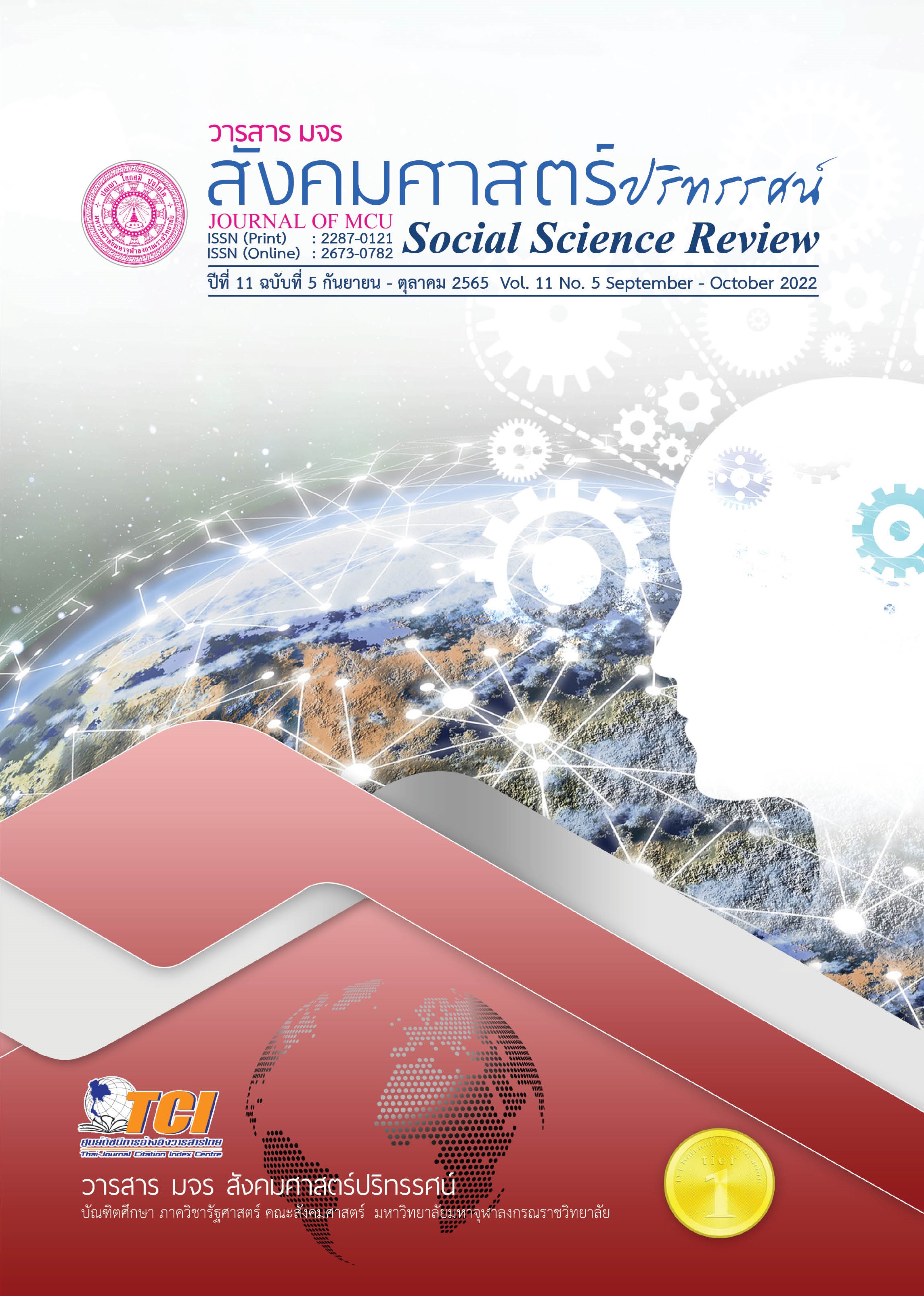การวิเคราะห์นวัตกรรมองค์กรของธุรกิจขนาดกลางและขนาดเล็ก สาขาธุรกิจอาหารอาหาร ในเขตภาคกลาง
คำสำคัญ:
การวิเคราะห์องค์ประกอบ, นวัตกรรมองค์กร, ธุรกิจอาหารบทคัดย่อ
งานวิจัยครั้งนี้มีวัตถุประสงค์ 1) เพื่อศึกษาองค์ประกอบของนวัตกรรมองค์กรของธุรกิจขนาดกลางและขนาดเล็กสาขาธุรกิจอาหาร ในเขตภาคกลาง และ 2) ตรวจสอบความสอดคล้องของโครงสร้างเชิงองค์ประกอบของธุรกิจขนาดกลางและขนาดเล็กสาขาธุรกิจอาหาร ในเขตภาคกลาง ใช้แนวคิดด้านนวัตกรรมองค์กร ด้านทฤษฎีการกระจายความรู้ของผู้ประกอบการ ทฤษฎีการแพร่กระจายของนวัตกรรม ประชากรคือผู้ประกอบการธุรกิจขนาดกลางและขนาดเล็กสาขาธุรกิจอหารในเขตภาคกลางจำนวน 400 ราย โดยสุ่มตัวอย่างแบบเจาะจงตามลำดับในใบรายชื่อ เครื่องมือที่ใช้ในการวิจัยกำหนดใช้แบบสอบถาม การวิเคราะห์ข้อมูลใช้การวิเคราะห์องค์ประกอบเชิงยืนยันและเชิงสำรวจ ผลจากการวิจัยพบว่า 1) ข้อคำถามที่ใช้วัดองค์ประกอบทั้ง 9 ข้อทุกข้อคำถามผ่านเกณฑ์ขั้นต่ำที่กำหนดคือต้องมีค่าน้ำหนักองค์ประกอบมากกว่า 0.50 และ 2) ผลการตรวจสอบความสอดคล้องของโครงสร้างพบว่ามีดัชนีวัดความสอดคล้องผ่านเกณฑ์ตามที่กำหนดคือ Chi-square=415.06, df=27, P-value=0.000, RMSEA=0.040
องค์ความรู้จากการวิจัยและการใช้ประโยชน์คือเพิ่มประสิทธิภาพในการบริหารจัดการด้านต่าง ๆ ช่วยลดต้นทุนในการผลิตและการปรับปรุงกระบวนการผลิตลดกระบวนการผลิตที่ไม่จำเป็นลง รวมถึงการเข้าถึงช่องทางการตลาดสมัยใหม่ผ่านสื่อสังคมออนไลน์ และสินค้าที่ผลิตอันได้แก่สินค้าประเภทอาหารจำเป็นจะต้องสร้างความแตกต่างในตัวสินค้า การผลิตให้ตอบสนองต่อผู้บริโภคและรสนิยม
เอกสารอ้างอิง
วรนันท์ สุวรรณปิฎกกุล และ ชุติมา ไวศรายุทธ์. (2564). แนวทางการเสริมสร้างศักยภาพของผู้ประกอบการด้านอาหารขนาดกลางและขนาดย่อมของประเทศไทย. วารสาร สมาคมนักวิจัย, 16(3), 76-88.
วิสาหกิจขนาดกลางและขนาดย่อม (SME). (2563). แนวคิดนวัตกรรมธุรกิจอาหาร. สืบค้น 26 มิถุนายน 2564, จาก: https://www.smeknowledgecenter.com/slides/slide/214
วัชรพงษ์ อินทรวงศ์ และ ปัทมา สุริยกุล ณ อยุธยา (2561). การศึกษาปัจจัยเชิงสาเหตุด้านภาวะผู้ประกอบการและนวัตกรรมที่มีต่อผลการดำเนินงาน ของกลุ่มวิสาหกิจชุมชนแปรรูปอาหารจังหวัดนครพนม. วารสารชุมชนวิจัย, 12(2), 101-117.
นงลักษณ์ วิรัชชัย. (2542). โมเดลลิสเรล: สถิติวิเคราะห์สำหรับการวิจัย. กรุงเทพฯ: โรงพิมพ์แห่งจุฬาลงกรณ์มหาวิทยาลัย.
ปณิตา เกตุแก้ว. (2564). แนวคิด ทฤษฎี การจัดการนวัตกรรมเพื่อการพัฒนา. สืบค้น 17 กรกฎาคม 2564, จาก: https://www.gotoknow.org/posts/692170
ปัญญา เลิศไกรและคณะ. (2562). การจัดการนวัตกรรมการพัฒนาองค์กร. สืบค้น 26 มิถุนายน 2564, จาก: file:///C:/Users/Phrat/Downloads/218069-Article%20Text-727834-2-10-20191101.pdf
สุชาติ ประสิทธิ์รัฐสินธุ์. (2544). ระเบียบวิธีการวิจัยทางสังคมศาสตร์. กรุงเทพฯ: สำนักพิมพ์เฟื้องฟ้า.
Olanrewaju, A., et al. (2018). Factors affecting Housing Prices in Malaysia: analysis of the supply side. Journal of the Malaysian Institute of Planners, 16(2), 225–235.
Taques, F. H., et al. (2021). Indicators used to measure service innovation and manufacturing innovation. Journal of Innovation & Knowledge, 6(1), 11-26.
ดาวน์โหลด
เผยแพร่แล้ว
รูปแบบการอ้างอิง
ฉบับ
ประเภทบทความ
สัญญาอนุญาต
ลิขสิทธิ์ (c) 2022 วารสาร มจร สังคมศาสตร์ปริทรรศน์

อนุญาตภายใต้เงื่อนไข Creative Commons Attribution-NonCommercial-NoDerivatives 4.0 International License.
เพื่อให้เป็นไปตามกฎหมายลิขสิทธิ์ ผู้นิพนธ์ทุกท่านต้องลงลายมือชื่อในแบบฟอร์มใบมอบลิขสิทธิ์บทความให้แก่วารสารฯ พร้อมกับบทความต้นฉบับที่ได้แก้ไขครั้งสุดท้าย นอกจากนี้ ผู้นิพนธ์ทุกท่านต้องยืนยันว่าบทความต้นฉบับที่ส่งมาตีพิมพ์นั้น ได้ส่งมาตีพิมพ์เฉพาะในวารสาร มจร สังคมศาสตร์ปริทรรศน์ เพียงแห่งเดียวเท่านั้น หากมีการใช้ภาพหรือตารางหรือเนื้อหาอื่นๆ ของผู้นิพนธ์อื่นที่ปรากฏในสิ่งตีพิมพ์อื่นมาแล้ว ผู้นิพนธ์ต้องขออนุญาตเจ้าของลิขสิทธิ์ก่อน พร้อมทั้งแสดงหนังสือที่ได้รับการยินยอมต่อบรรณาธิการ ก่อนที่บทความจะได้รับการตีพิมพ์ หากไม่เป็นไปตามข้อกำหนดเบื้องต้น ทางวารสารจะถอดบทความของท่านออกโดยไม่มีข้อยกเว้นใดๆ ทั้งสิ้น





